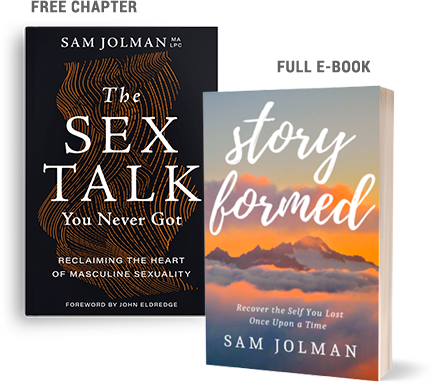“Emotions are the language of the soul. They are the cry that gives the heart a voice.” Dan Allender, Tremper Longman
“I’ve never met an irrational emotion. Once you know the whole story, they always make sense.” Sue Johnson
“Things are not all so comprehensible and utterable as people would mostly have us believe; most events are unutterable, consummating themselves in a sphere where word has never trod.” Rilke
How does that make you feel? Its oh so comically true. We as counselors ask that question a lot. You may roll your eyes now. Before you totally write us off, consider this: How often are you ever really asked how you’re doing? I mean in a way that allows you to answer with more than the role of the tongue I’m-good-how-are-you? When is the last time someone sat down and waited for your heart to show up?
Even though its probably a rare experience for most of us, everyone loves to be listened to and pursued. Why is that? What’s so life giving about being asked how are you doing?
Its because to care about a person is to care what they feel.
Did you know emotions are quite literally the language of your heart? Truly. Your heart is trying to talk to you. Its constantly experiencing the life you live and trying to get in on the conversation with you. And when it speaks, it speaks in emotions – in passions and feelings and desire. To care about your heart then is to care what it feels.
Emotions get a pretty bad rap in most circles. In our culture, an emotional man is a weak one and an emotional woman is at best unstable but maybe just crazy. Most self help (and Christian) writing exists to tell you how to tame your emotions.
And yet on the other hand, no one wants to relate to Spock types who don’t have emotions. Being around these people feels awfully boring. Like they’re kinda dead. We usually run out of things to talk about real quick with these people. And work to find someone else in the party to talk to.
Sure we don’t really like it either when someone is emotionally out of control. Yes, people do over react to things (Read about one experience I had here). A lot of damage is done when people simply live out of their emotions. If we only follow our every emotional whim, we can’t be mature people.
But on the other hand, the only way to understand the events of our lives is by tuning into our emotions. Stuff happens to us. But its how we feel about it that tells us what those events meant to us.
Last summer I took my son to a rodeo parade. Its just the sort of thing a boy dreams about. Big excavating equipment, fire engines and marching bands, and a bazillion horses. All of this intermixed with people throwing candy right in your lap. Heaven on earth. Brandt sat transfixed for all of it. Until the clowns. How had I forgotten about the clowns?
Have you ever noticed just how creepy clowns are? That white face with those big lips, masking some old guy who likes his job a little too much. Its like something out of a kids worst nightmare. I mean how did this whole thing start?
My son caught sight of one giggling his way towards us. In the blink of an eye, his limp warm little body nestled in my lap became stiff as a board. Like spurs on a horse, he dug his little hands into my chest. And you bet it prodded me into action. I scooped him up and we shot through the crowd of people in about 0.8 seconds flat.
They passed and he eased his grip. I breathed a sigh of relief. I’d saved him from the weirdos.
“That was scary, wasn’t it?” He looked at me, “Sca-wee?” Oh, right, he had never heard this word before in his less than two year old life. He said it again, “Sca-wee.” Like he was rolling it around on the tongue, trying it on for size. “Yeah, bud, those clowns were scary, weren’t they?” “Cwowns… sca-wee.” It clicked. His experience had a name. I had given my son a word for what was happening inside. And something in him rose up… empowered.
He told his mom when he got home that the men with painted faces were scary. He told me later in his crib that we saw horses and marching bands and clowns that were scary. And even to this day, he still talks about the scary clowns when we remember the parade.
I know some of you might be freaking out thinking my son is now traumatized. I wondered the same thing until I started paying attention to his tone. When he talks about it, he says it with pride, like he knows something. And he does, he knows his own experience. He knows how to tell his own story and talk about his heart.
Isn’t this the thing we all long for? We are dying to make sense of our inner worlds. To know why we feel what we feel. There’s nothing more powerful than to know our own experience. It is literally empowering, centering, anchoring.
Here’s the dilemma: We all eventually stop paying attention there to some degree or another.
Just this week I asked a woman the question, “How do you feel about that?” She looked up, with a blank face and said, “I have no idea. I literally have no words for what’s happening in my heart right now. I stopped paying attention there a long time ago. And I feel so out of practice.” She probably speaks for most of us.
Life leaves little time to sit and feel and make sense of our lives. Or what we feel there is just too unpleasant or confusing. So we stop. Or never start. In the words of the Puritan writer John Flavel, “Some people have lived 40 or 50 years in the world and have scarcely had even one hour’s discourse with their own hearts all the while.”
Listening to your heart takes practice. And work. Emotions don’t translate well to English. Or Spanish or German for that matter. They are a very foreign tongue. I probably don’t need to tell you that. As such, emotions always need interpretation. I love Rilke’s words here, that most of what happens to us, happens in a wordless place within. And its just dang hard to put to words.
Clients often say to me, “I don’t know what I’m feeling.” And I tell them sometimes you just have to guess. Its like sometimes when you’re lost you have to just start walking in a direction until you start recognizing something.
I find great comfort in the words of therapist Sue Johnson, “I’ve never met an irrational emotion. Once you know the rest of the story, they always make sense.” There’s always more story. Emotions are never random, even though they may be about stuff beyond what’s happening in the moment.
Here’s one of those moments from my life.
On opening day of elk archery season I cracked my eyelids at 4:30 AM. Within minutes, my friend PJ and I left the warm cocoon of our sleeping bags, dressed in the pitch black and very cold darkness, and began our foray into the mountains to find some elk.
And elk we found. The morning was a complete rush. Or almost complete, except for the moment I shoot an arrow over the back of a cow elk.
At 3 in the afternoon, a rain storm hit pretty hard. We hunkered down under a grove of pine trees to take a nap if possible and wait out the rain as surely the elk were doing too. But I could not fall asleep. I could not find any comfort. My heart felt… something. And something intensely.
At best I could name that I was lonely, particularly for my wife and son. But that didn’t seem quite right. I’d only been gone a day. And especially because if I was honest, I actually felt scared too. None of it made any sense to me. But it sat on my chest like a boulder and wasn’t going away.
So I started talking my way towards it. “PJ, I’m not doing well. And I have no idea why.”
PJ cracked his eyes open and turned my direction. I kept talking. “I feel lonely kinda… but scared too.” After fifteen minutes or so of just wandering about in my heart, this sentence popped out, “I feel so fatherless out here in the mountains. I’m afraid God’s not going to show up as a father.” And boom! The floodgates of my heart opened up. And I wept. There was my heart.
That was work. But it made all the difference.
So… How do you feel these days?




8 Comments
Sam, am going through a tough emotional experience at present. Am having to put many emotions on “hold” until a certain milestone is reached (think Deb shared some of it with you…what a journey). I’ve learned to leave “marker buoys” to return to and do a “deep dive” later. Can feel them on the edge but have to finish the mission. Thanks for permission to go after ’em.
Yes, Mark… I get it… especially hearing the story from Deb. There are those times you have to get through. I agree completely. May God be merciful to you and give you space for your heart too when its right.
Sam, as I lay here in a bed that I made (quite literally), I’ve found I’ve followed these emotions to what feels like a dead end. I love my wife, but now she doesn’t love me, and it’s my fault. I’ve never felt so much pain, and it’s mixed with feelings of grief, guilt, and confusion. All I need is an ounce of hope. But I’m struggling to find that.
Not sure why I’m posting this…
Brad, this space doesn’t allow me to offer any counseling. And so maybe its time to pursue a counselor. I would simply say there are no dead ends in the heart.
This is an extremely helpful post! Thank you for sharing this wisdom.
I often find a large section of my emotions very overwhelming and utterly confusing. I am fairly good at giving myself room to feel the emotions that I can make sense out of. But those confusing emotions…I think I had given up on ever making any sense of them, so I just shut the door on my messy closet full of “too much” emotions (hoping they won’t all burst the door down and drown me.)
This story and wisdom you shared gives me hope that God can come for even the most confusing emotions I feel. That my heart is not too much for him. Thank you!!!
You are so welcome, Sarah!
I think the deal is that yes, emotions are important, but….it’s those emotions like “I feel like I have no friends” when in fact I did. Or “Nobody loves me” when in fact I had family and friends that did. Or my mother’s feelings of suspicion (and also very hurtful accusations) that someone stole something when she’d simply misplaced it. There are also feelings like “life is not worth living” when it’s up to us to find meaning and value in life – others cannot provide that for us. I’ve gone through all of this myself and I’ve acted on the “life is not worth living” one several times. And since then, I’ve found that there are some emotions that I dare not listen to because they are not a reflection of reality.
Great feedback and critique.
Let me reiterate: Emotion always needs interpretation. And this takes work to get it right. “I feel like I have no friends” is not an emotion. That’s an interpretation. Maybe the original feeling is loneliness, maybe shame, maybe rejection.
When the interpretation is wrong, we need to figure out how it got there. How did it get twisted? Was it something someone said to you one time? Or evil’s whispers and lies to you? Past trauma? And so it would be good to ask why loneliness or shame or rejection have been interpreted as having no friends. That’s where we have to unpack and know our stories.
Emotions don’t lie but they must be translated well. Hope this helps.